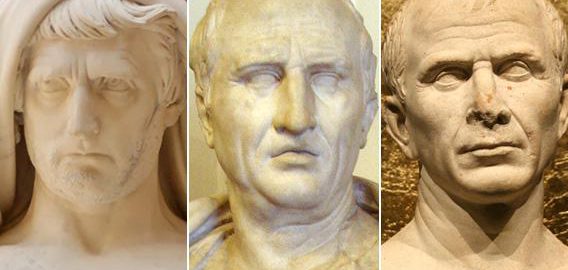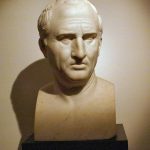The crisis of the Roman republic in the first century BCE largely resulted from the degeneration of Rome’s political life. The goal of individual politicians was not healing res publici and reforming the state, but private interests and climbing up the steps cursus honorum, and then be able to gain wealth.
Every politician dreamed of achieving a pretend, consulate, followed by the positions of proconsul and propretor. The rules of political life were extremely simple. A person who wanted to get high in the hierarchy of political life, first had to seek support from the urban poor or the upper classes. This could be achieved in three ways:
- by completing a aedile, a politician could win over the poor masses by publishing the great games that the Romans loved. Along with the sharper political struggle, the splendor of such events increased. Cicero states, for example, that Gnaeus Pompey in 55 BCE competing with Caesar released “the greatest and most expensive [games] ever to be”. In turn, Milo in 54 BCE wanting to defeat his rival, decided to sell his three properties in order to be able to release a great spectacle. The poorest provided support to electoral commissions.
- offering gifts to their clients and the poor (so-called congiaria).
- bribing voters. Interestingly, bribery was normal in the Roman republic. Naturally, corruption was seen to be detrimental to the good of Rome’s political and social life. To this end, attempts have been made to tighten the law on electoral abuse (de ambitu). However, this did not have a major impact on improving the moral sphere.
Bribery took place mainly through intermediaries (divisores), i.e. officials responsible for the distribution of grain. To ensure the receipt of votes, first the appropriate amount went to the intermediary (sequestres), who only issued the payment after the results of the vote. This procedure was often public and took place in public at the Flaminius Circus, and sometimes at the house of the consul in office.
The money offered to support the candidacy was often enormous. Cicero in his letter mentions that Memmius and Domicjusz wanting to eliminate the third candidate, formed a coalition (cotio) and promised the first voting centuria 10 million sesteria. In turn, during the election of consul, Milon gave a thousand aces to each tribus member. It is worth adding that bribery was often explained by politicians in the state’s interests, which suggests that it was considered to be something completely normal. Even the word accipere, meaning “accept”, which professionally meant bribery, entered the Latin dictionary of those times. Both poor and often indebted nobles and equites were bribed.
It cannot be denied that social relations of politicians were of great importance in the elections. Cicero’s brother, Quintus, in his letter De petitione consulatus advises Cicero to seek friends among senators and equites, liberation clients or even slaves who often influence their masters. In addition, Cicero should not be limited to Rome, but should run the election campaign even in colonies or prefectures. It is important that as a candidate he promises everyone help (even if we know that he will not give it) and that he is kind and cheerful. It is worth having even a special slave (nomenclator) who, following his master, will remind him of the names of people he met on the street; in this way Cicero will be able to greet everyone by name. It is also worth expressing praiseworthy speeches in honor of the Senate, living in harmony with it and emphasizing its importance.
As you can see, political friends (officia amicorum) were very important in the political world of republican Rome. Noteworthy, however, these friendships were often fake and aimed at pure personal gain. For example, Cicero initially hating Caesar’s follower Watinius, whom he publicly ridiculed and accused, after a few years he liked him very much – as it turned out for political purposes. The Roman political scene was extremely false and full of dishonest accounts. The temporary profit and help of another politician was important.
As it is today, Rome was also not free of public accusations and attempts to ridicule and discredit the political opponent. It was common to call a rival a thief or accuse him of sexual crimes. As you can see, so many modern countries have taken the political principles of Republican Rome, but unfortunately they have also taken over many negative aspects of political life.







